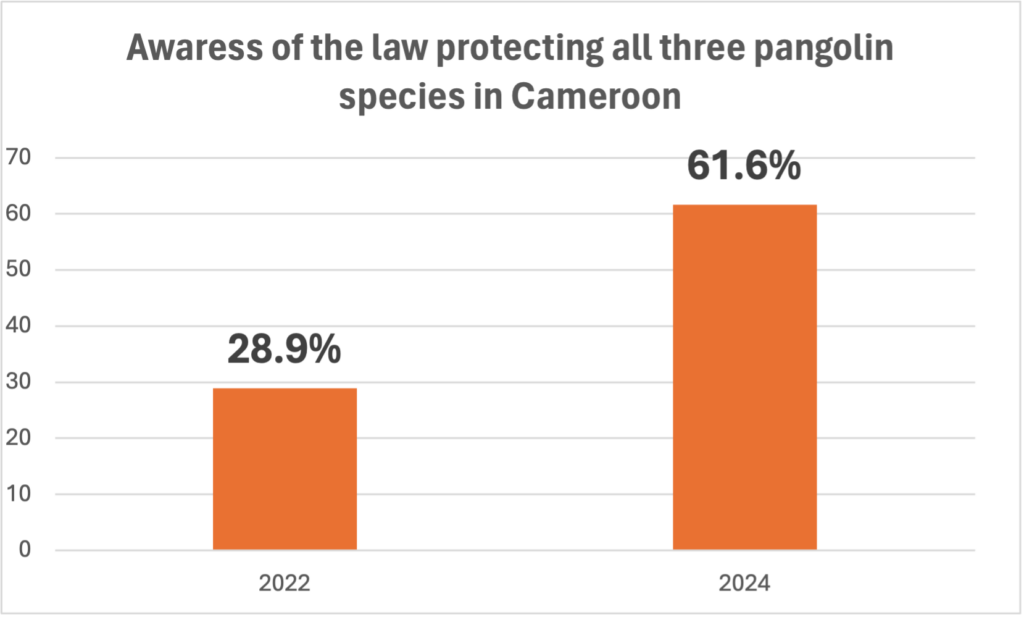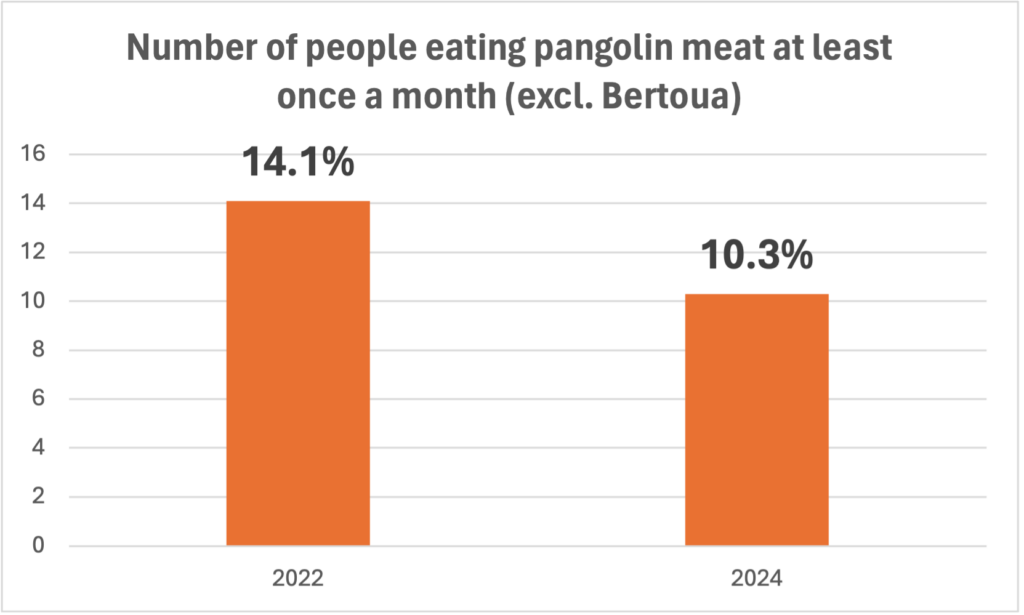
Pangolin meat consumption has fallen significantly in urban Cameroon in the past two years, as awareness of—and support for—a 2017 law banning the capture and killing of these endangered animals has risen sharply, a new WildAid study has found.
Over 60% of urban Cameroonians are now aware of legislation passed seven years ago banning the capture and killing of pangolins—more than double the number in 2022. Two-thirds of city and town dwellers now support the protection of pangolins, according to a survey conducted in five towns and cities by Cible Etudes & Conseil, a Cameroonian research company.
At the same time, the Cameroonian government is stepping up enforcement of the law banning the capture and killing of all three species of pangolin found in the country.
In 2022, WildAid, in partnership with Cameroon’s Ministry of Forestry and Wildlife (MINFOF), launched a campaign to raise awareness about the law and the threats facing pangolins. The campaign was led by some of Cameroon’s leading musicians and footballers, as well as by traditional leaders, who encouraged their compatriots to “Say No to Pangolin Meat”.


Two years later, WildAid surveyed the public opinion of 500 respondents in Yaoundé, Douala, Bertoua, Ebolowa, and Mbalmayo where pangolin meat consumption has traditionally been relatively high. The interviewees were balanced by gender and age groups.
Awareness of the law banning the capture and killing of pangolins has more than doubled in the past two years, with 61.6% of people in the latest survey correctly saying that all pangolin species are protected, up from 28.9% in 2022.


The proportion of respondents agreeing with the statement that the hunting and killing of pangolins should be forbidden rose to 67%, up from 56.4% two years before.
Cameroon stepped up pangolin protection on the heels of a ban on international trade in pangolins under the Convention on International Trade in Endangered Species of Wild Fauna and Flora (CITES).
Anyone found in possession of a pangolin or any part of the animal without a license is deemed to have captured or killed it and faces a fine of 3 million to 10 million CFA ($4,900 to $16,400) and imprisonment of 1–3 years.
However awareness of the law was low, and pangolin meat was still openly consumed in Cameroon’s cities, a commercial trade that was helping to push pangolins towards extinction.
Now there are real signs that the situation is beginning to change.
Nearly 60% of respondents said they had seen the campaign. Of that number, 29% said it had convinced them to stop eating pangolin meat. A further 5.4% said the campaign had convinced them to eat less pangolin meat.
Looking at the cities and towns of Yaoundé, Douala, Ebolowa, and Mbalmayo, the number of people who said they consume pangolin meat once a month or more frequently fell to 10.3% in 2024, down from 14.1% in 2022. That’s a decline of 26.7%.


“We are hugely encouraged to see the growing support for pangolin conservation and the decline in consumption of pangolin meat in Cameroon,” said Simon Denyer, Africa program manager at WildAid. “Creating a safe haven for pangolins in Cameroon is key to ensuring their survival in Africa, and this is a big step in the right direction.”
There was a slight rise in reported consumption in Bertoua over the period, but researchers said strict post-pandemic controls on bushmeat consumption remained in place in that town when the survey was conducted in 2022, not only depressing bushmeat consumption but making people reluctant to admit to eating bushmeat at that time.
The controls had been imposed because of fears that bushmeat consumption had been the cause of the COVID-19 pandemic and saw all bushmeat markets closed in Bertoua and a checkpoint placed on the main road to Yaounde, researchers at Cible said.
The 2024 survey also found a growing awareness of the threats facing pangolins and appreciation of their ecological and cultural value.
In the latest survey of 500 people living in the five towns and cities, three-quarters of participants agreed with the statement that pangolins are threatened with extinction (75.0% in 2024, up from 70.0% in 2022), while 67.2% said pangolins contribute to maintaining a healthy environment, another big jump from 55.2% in 2022.
Pride that pangolins exist in Cameroon rose from already high levels, reaching 95.2% in 2024, up from 92.7% two years before.
“When we started this campaign, people didn’t seem to understand why we were doing it,” said Jennifer Biffot, WildAid’s Francophone Africa representative based in Cameroon. “But after a few months, we saw awareness growing, and gradually local media also began to publish stories about the plight of the pangolin in Cameroon. That really helped.”


There are also signs that the government is stepping up its enforcement of the law. On March 30, wildlife and law enforcement officials raided the Nkolndongo market in Yaounde, one of the largest illegal bushmeat markets in the country, on the orders of Minister of Forestry and Wildlife Jules Doret Ndongo.
A team of 71 agents and support staff paid a surprise visit to the market looking for protected species on sale and rescued six live white-bellied pangolins and one monitor lizard. According to a press release issued by MINFOF and the Tikki Hywood Foundation, which runs a rescue, rehabilitation, and release center for pangolins in Cameroon, they also destroyed illegal vending stations and raised awareness about the law protecting endangered species.
Many of the rescued animals were injured. The aim is to rehabilitate them and eventually release them back into the wild.
“With this huge undertaking, the government is making a powerful statement in ending the illegal wildlife trade in Cameroon,” the press release said.
Pangolins are thought to be the most trafficked animal in the world. WildAid also works in Asia to reduce demand for pangolin scales, which are widely used in traditional medicine—even though scientific studies have found no evidence they contain any medicinal value.
Stay in touch and get the latest WildAid updates.
SIGN UP
